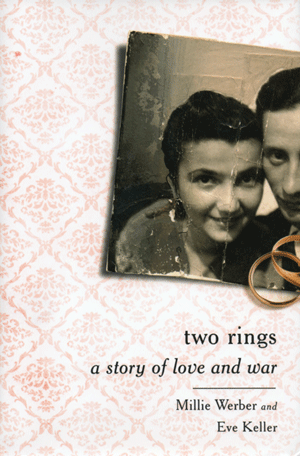Reviewed by NEAL GENDLER
Millie Werber was fortunate to survive the Shoah, but like so many others, not without terrible misfortune.
Werber lost her mother, brother, grandparents and her first husband, the all-consuming first love of what, in normal times, would be late adolescence. But in a moment of extraordinary help, she managed to save her wedding ring and one she gave him.
The story behind those rings and her wartime ordeal — a Polish factory, Auschwitz and a factory in Germany — is charmingly told with the help of Eve Keller, a professor of English at Fordham University. Whether this Shoah memoir deserves more or less attention than others is pretty much irrelevant; all survivors have stories that are different and interesting, with varying degrees of drama and often some instant of fortune that meant life instead of death.
Werber’s life was saved by a Pole, two Jews and a German.

As Jews in the Radom, Poland, ghetto were being killed or dragged off, Werber, then teenage Mania Drezner, was persuaded by Feter, her uncle, that work meant her best chance of survival. At a metal factory making weapons, she ran a drill 12 hours a day to produce 1,500 parts with great precision; if more than three were imperfect, she might be shot for sabotage.
One day, her Polish supervisor took her aside to tell her that her entire previous day’s production was flawed. But instead of turning her in, he returned her to work and slowly switched out the bad parts for good ones.
A Jewish ghetto policeman at the factory, Heniek Greenspan, took a fancy to her and got her moved to a safer job in the factory kitchen. Ghetto police don’t always enjoy a favorable reputation, but Werber portrays Greenspan as sensitive and devoted. Married in the ghetto by Feter, they managed some private times, once even slipping out for dinner and dancing in the city.
After a few months, another ghetto policeman, jealous of Greenspan’s position, arranged to have him arrested. Mania saw her husband being led away forever. Soon after, she was mistaken for a woman named Greenspan and held in a basement cell. A cellmate named Katz told her he knew she was Drezner, not Greenspan, and if interrogated ahead of her, would say so. He was and he did; she was hit twice and returned to the factory.
Later, Feter saved her from a roundup by hiding her under a floorboard about 12 inches above the dirt; rats swarmed over her motionless body.
With Russians approaching, the factory workers were sent to Auschwitz. As the thousands of arrivals stood naked, Mania hid her only photo with Heniek in her aunt’s shoe. Another woman volunteered to hide the rings in her vagina.
Taken later to work in Germany, starving Mania was saved again when an older German began leaving her portions of his single daily sandwich.
Liberated, she moved to a house in Germany with other Radom survivors. She became friendly with Jack Werber, and soon they were married — again by Feter. In 1946, they came to Beacon, N.Y., where Jack’s brother had come before the war and become wealthy. The brother’s wife, also from Radom, treated Millie with humiliating disdain, insisting immediately that she take a bath. As she lay in the tub drawn for her, Millie was told that the water had been treated with a disinfectant.
Eventually, Jack and Millie had two sons and built a successful career in real estate. Jack died in 2006.
Millie kept much of this private for 60 years, until a son persuaded her to tell it to Keller. The result keeps you turning the pages, some of which have photos of Mania/Millie and her family. I’d have liked Keller to have done less smoothing of Millie’s speech, leaving us more of the flavor of a generation too rapidly slipping into history, but I’m glad she got this story into print.
***
Neal Gendler is a Minneapolis writer and editor.
(American Jewish World, 3.30.12)




















